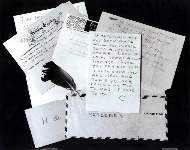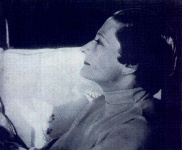|
Garbo's letters to Mercedes de Acosta |
|

The letters gave no evidence of a love story!
Introduction |
Mercedes was a Spanish-American poet, playwright, costume designer and socialite, she knew many famous celebrities of the show business. She had rumored love-stories with actresses like Marlene Dietrich, Eleonora Duse, Isadora Duncan. But it is said thst the woman she loved most of all was absolutely Garbo.
Many reporters and even some fans, waited so long for the so called "love letters" of Garbo to Mercedes d'Acosta to be unsealed in the year 2000, but it came as great disappointment for them, that no lesbian attitude could be detected.
 
They met in 1931 and De Acosta was soon obsessed by Garbo. An obsession that continued until the end of the 1960's, when De Acosta published her memories and wrote many pages about Garbo. The two were introduced by author Salka Viertel, with whom Garbo was also rumored to have been involved. Her relationship with Garbo has often been described as the love of her lifetime. It is doubtful from all information from the time that Garbo shared those feelings. Garbo was in control of the affair, and the two would be together for lengthy periods often taking vacations together, then apart for long spells without Garbo even acknowledging de Acosta, and everything was at the will of Garbo.
A love affair? |
In 1944, Garbo ended the on-again off-again relationship. At that time, she insisted de Acosta stop sending her poems and letters professing her love. The last known poem written by de Acosta for Garbo was written that same year. By all accounts, de Acosta remained in love with Garbo for the remainder of her lifetime.
The letters and the Rosembach Museum |
Mercedes ask that 10 years after Garbo's death letters supposedly love letter be opened and it was found there is no evidence of an affair between the two women. In 2000 in the Rosembach Museum a box containing the papers and letters Garbo wrote to De Acosta from 1931 to 1960 was opened but nothing gave evidence of a love story. It seems Garbo was cold and reserved even in her letters.
Lost and forgotten, in 1960 Mercedes De Acosta sold her Garbo papers to the Rosenbach Museum and library of Philadelphia that had to keep them sealed until 10 years after the death of Garbo.
The box contained 88 letters, telegrams and cards was opened in the April 2000 but nothing revealed that there was an intimate relationship between the two women. No love-protestation, no love-confidence.
Garbo and Mercedes de Acosta met the first time in 1931 and in that period they spent a vacation together in the Sierra Nevadas. A few years later Garbo's passion cooled, partly due to the demanding, obsessive behaviour of Mercedes, while De Acosta tried for almost two decades to recapture her Swedish friend.
It is possible that Mercedes decided to destroy the most intimate letters, so this could explain the long interval of time from one letter to the other. The letters are written in pencil, most of the time are undated, unsigned, or rarely signed G or GG or HB, that means Harriet Brown. Most of the letters are faded now. They are going to vanish, as Garbo wanted.
Experts from the letters |
From 1931 to 1935 there are only nine letters and this sounds rather strange because it's the period Garbo and Mercedes were very close friends, the top of their relation-ship. At the beginning, Garbo told her friend how much she disliked Hollywood and her job that she thought was painful.
In 1935 there was just one letter from Stockholm . Garbo was rather cold, she wrote that she was going through a bad period of her life, she was nervous and told her friend that if she wished to join her she could stay just one day. In 1938 Garbo wrote that she had not much to tell, she could not talk about her private things, she was troubled and unhappy.
In 1946 Garbo sent a greeting-card to Mercedes, from Hotel Plaza in Manhattan . She wished her friend happy birthday but told her not to call her by telephone.
The other letters were written from 1948 to 1958. Garbo would name her friend Mercedes "my dear boy " or "sweety" or "black and white" (because she used to dress in black and white - no colour at all ). She often said that she wished to be left alone and not to be disturbed by the phone-calls of her "dear boy". She wrote: "You arrived in the most unsuitable moment. Be a good boy and don't bother me now."
In one letter in 1950 Garbo wrote: "Look my friend... it is tiresome to talk about a situation that doesn't seem to change and for which none of us has a solution... And I simply cannot go through over and over again this thing... It was a waste of emotion repeating the same thing I... can offer no solution for.". It seems Garbo was often annoyed by Mercedes' jealousy.
Again, in 1958: "You always come with the same line, that you always find out everything and so fort [sic] and so fort [sic]. If you would stop finding everything out, I would like it more. I close up like a clam to all people who always find everything out. Take what is offered for the moment and that is yours."
One letter was sent from Indio , California . Garbo complained about the wind of the desert that made her nervous, she did not know how much time she would have stayed there. It depended on George Schlee, her costant travel companion. She was not sure about her relation with him. In one letter from Beverly Hills she later wrote that her visit in the desert was a flop and that she felt lost everywhere she went . She though life was cruel.
One year later, from Beverly Hills again, she wrote that she hated to make plans, to fix things and travels - that the crowd was insufferable.
Again she did not want to see anyone, she wanted to go nowhere and only wanted to go to bed at nine in the evening. She would have liked to have houses in every corner of the world, having someone to fix things...
It seems she wanted to hide and go away from all the places she used to visit...
She writes to Mercedes: "I am scared of everything. I am afraid of the train, of the cabs. I am afraid of the night".
In these letters Garbo is always "controlled". She rarely mentioned the people she used to see, the books she read - Not a word about the motion-picture industry...
One letter from Garbo to de Acosta in 1950 says: "If you have a few minutes free one day, would you be so kind and get up to the lampshade place on Lexington right next to 'Dovers' [and] ask for my little lampshade frames I left there."
Another - addressed "Honeychild" - thanks her for getting them.
Cecil Beaton and De Acosta shared a long time correspondence and most of the time the subject they used to discuss was - of course - Garbo. They were both obsessed by her. In the winter 1958/1959 Mercedes wrote to Beaton: "We went shopping this afternoon and it is remarkable the sensation she always causes. Every block someone remarked her and some girls followed us and tried to photograph her. God knows how they recognized her for she had a muffler tied around her head, that old tired seal-skin coat down to the ground and great snow boots. Hardly the conventional movie star but the little face is always beautiful and they probably just see that."
Someone said that in her last years Mercedes blackmailed Garbo. She was poor and seriously ill and asked for money. It seems she menaced to sell the letters and made them public if Garbo wouldn't have paid for them. But "someone" paied the bills and the letters were never sold. In fact they were hosted at the Rosenbach Museum , far from the "hands of vulgar people".
Cecil Beaton revealed in his diaries that Garbo broke with De Acosta not because she wrote about her in her biography "Here lies the heart" but because Garbo though Mercedes brought her bad luck. It's just a consideraton but the two women hardly saw each other in the '60's.
De Acosta was a fascinating person but more interesting to read about than having as a friend in the real life. Too much obsessive, to much demanding.
The day of the funeral of Mercedes De Acosta somebody claimed to have seen Garbo dressed with a coat and dark glasses - practically unrecognizable - on the other side of the road. The last, furtive goodbye?
Thanks to Gianni |
| |